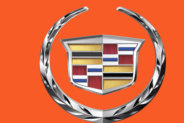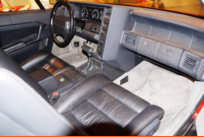

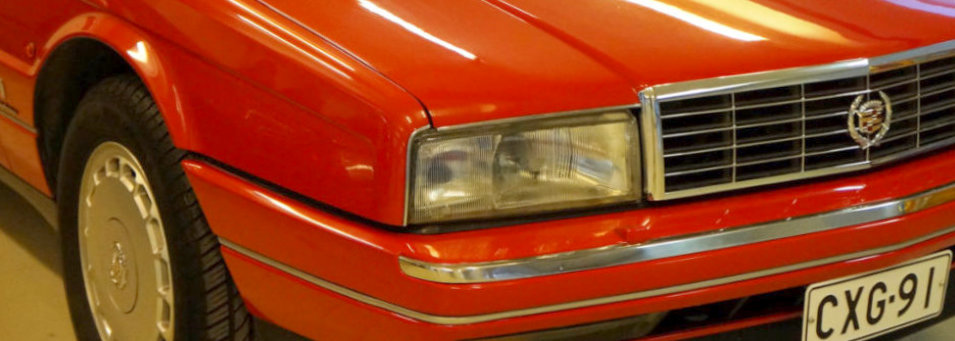

Designed to compete with the Mercedes-Benz SL

Cadillac Allante - 91
The Allanté is a two-door, two-seater roadster
manufactured and marketed by Cadillac from 1986 until
1993, with roughly 21,000 units built over a seven-year
production run.
Originally designed to compete with the Mercedes-Benz SL and Jaguar XJS, the Allanté featured a slightly modified variant of the 4.1 liter V8 used across Cadillac's model line. The Allanté is noted for an unusual production arrangement, where completed bodies — designed and manufactured in Italy by Pininfarina — were shipped 4,600 mi (7,400 km) from Italy in specially equipped Boeing 747s, 56 at a time, to Cadillac's Detroit/Hamtramck Assembly plant where they were mated with domestically manufactured chassis and engine assemblies.1987
The 1987 Allanté featured a removable aluminum hardtop, the industry's first power retractable
AM/FM/Cellular Telephone antenna and a multi-port fuel injected variant of GM's aluminum 4.1
L (250 cu in) HT-Cadillac 4100 V8, along with roller valve lifters, high-flow cylinder heads, and a
tuned intake manifold. The roadster featured an independent strut-based suspension system
front and rear, Bosch ABS III four-wheel disc brakes and a complex lamp-out module that
substituted a burned-out bulb in the exterior lighting system with an adjacent lamp until
correction of the problem. The Delco-GM/Bose Symphony Sound System – a $905 option on other
Cadillacs – was standard on Allanté. The only option was a cellular telephone, installed in a
lockable center console.
1988
For 1988, the Allanté featured revised front seat headrests, and a power decklid pulldown as standard equipment. Analog instruments, in place of the standard digital dash cluster, were also now available as a no-charge option. The base price was raised to $56,533, with the cellular telephone still being the only extra-cost option.1989
In 1989, the price rose to $57,183. Allanté's engine, the new 212.0 in (5,385 mm) 4.5 L V8, produced 200 horsepower, and with 270 lb·ft (366 N·m), it provided the most torque from any front-wheel-drive automobile in the world. Unlocking the trunk also unlocked the side doors – similar to Mercedes-Benz and BMW. As a theft-deterrent, Allanté added GM's Pass Key (Personal Automotive Security System), utilizing a resistor pellet within the ignition key that has the ability to render the fuel system and starter inoperative if an incorrect ignition key is used. Allanté also received a new speed-sensitive damper system called Speed Dependent Damping Control, or SD²C. This system firmed up the suspension at 25 mph (40 km/h) and again at 60 mph (97 km/h). The firmest setting was also used when starting from a standstill until 5 mph (8.0 km/h). Another change was a variable-assist steering system.1990
In 1990, Cadillac offered a lower-priced ($53,050) companion model with a cloth convertible roof and without the removable aluminum hardtop, and a model including the hardtop at $58,638. By midyear, prices were dropped to $57,813 for the hardtop/convertible and $51,500 for the convertible, which included a $650 Gas Guzzler Tax along with $550 destination charge. The fully integrated cellular telephone, which was equipped from the factory on just 36 cars this year, was available for an additional $1,195. Allanté's bumper-to-bumper new car warranty, seven years and 100,000 mi (160,000 km), was three years longer than other Cadillacs, and an additional 50,000 mi (80,000 km) of coverage. Allanté owners also received a special toll-free number to call for service or concerns. Headlamp washers and dual 10-way Recaro seating remained standard, among other niceties. A driver's side airbag was added to the leather- wrapped steering wheel, eliminating the telescoping steering wheel — which retained its tilt feature. The analog instrument cluster – introduced the previous year – was standard on the convertible (available at no extra cost on the hardtop/convertible), however, only 358 cars were equipped with the analog cluster. Technological news was the addition of traction control – the first front-wheel drive automobile in the world to be equipped as such. The elaborate system was able to cut fuel to up to four cylinders to reduce power and optimize traction. The electronically controlled shock absorbers were retuned to remain in "soft" mode for up to 40 mph (64 km/h). Previously, they entered "normal" mode after just 25 mph (40 km/h). A revised audio system allowed a CD player to be added as standard equipment, along with the cassette player. Of the 2,523 built for 1990, only five were exported – four to Canada and one to Germany. Allanté was available in eight colors this year, the most popular was Euro Red, found on 1,012 cars, while the least chosen was Gray Metallic, with only 28 made. Interior color choices (and production figures) were Charcoal Gray (1,343), Natural Beige (767), and Maroon (413).1991
In 1991, Cadillac added a power-latching mechanism for the convertible top, and the digital instrument cluster, featured in all but 275 Allanté models this year, was repriced (it was now a $495 option for the convertible model). Prices began at $57,260, although a midyear price-drop brought the Allanté convertible down to $55,900, and the hardtop/convertible down to $61,450 (from $62,810). Allanté still boasted the most luggage room in its class; an astonishing 16.3 cubic feet of storage (when utilizing the pass-through compartment into the cabin area), more than twice the 7.9 cu ft (220 L) trunk of a Mercedes SL. Of the 1,928 models produced for 1991, only seven were manufactured for export – five to Canada, one to Italy, and another to Puerto Rico. Canadian models offered a kilometer-based instrument cluster, daytime running lamps, and an engine block heater as standard equipment, while the Italian model featured a list of European-mandated modifications, including breakaway side mirrors, specific European headlamps and turn signals, a front tow hook, rear fog lamps, deletion of the deck-lid mounted center brake light, a wet-arm windshield washer system, coolers for the power steering and automatic transmission fluids, and a revised steering column to compensate for the removal of the driver's airbag. The rarest factory color was 49U – Light Blue Metallic, of which 20 were made, while the most popular color (with 569 manufactured) was 47U – Euro Red. The most popular interior color, 171 – Charcoal Gray leather, was featured in over half (1,009) of the 1991 models.
1991
Engine 4.5 litres 8 cylinders Power 200 HP Lenght 4,5 m Widht 1,8 m The collections Allante has been driven only ~34 000 kilometres. BK- Group is the first owner of this unique piece. It has also the original optional hard top roof.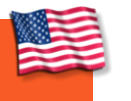
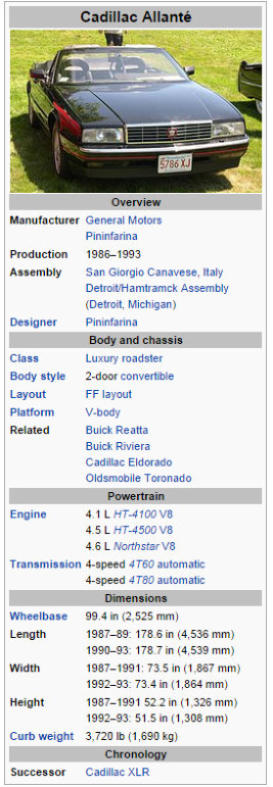
Photos mainly by Matti Kreivilä. Historical facts and technical details of the vehicles provided by Wikipedia. Movies YouTube.



- Decade of 60's
- Austin 850 Pickup - 1962
- Chaika Tshaika 13 GAZ - 1962
- Citroen 2CV - 1961
- DKW Junior - 1961
- Fiat 1100 - 1963
- Ford Taunus 12M - 1961
- GLAS 1204 - 1963
- MG 1100 - 1964
- Moskvich 407 - 1961
- Nagetusch caravan - 1961
- NSU Printz 4 - 1961
- Opel Kadett A - 1964
- Panhard PL17 - 1961
- Peugeot 404 - 1962
- Renault Dauphine - 1965
- Simca Aronde P60 - 1960
- Simca 1000 - 1966


